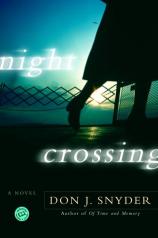Reading Group Guide
Discussion Questions
Night Crossing

1. The novel opens with a ship crossing the Irish Sea. Why do you think the author chose to begin the book here and how does this initial "crossing" compare and contrast to the crossed borders of time and persons made at the book's close? How does this initial crossing of the English Captain set the tone for the book as a whole?
2. How is Nora's journey in Northern Ireland linked to her journey in the United States before she arrives in the shattered city of Omagh? Although both of her journeys reveal something about how humans learn to suffer with dignity–what are some of the reversals that happen within Nora's character as she struggles to define her self worth at home and abroad?
3. Snyder refers to Nora's pregnancy as "a grain of rice in her belly." What effect does the repetition of this language have on the reader, and what connotations does this language produce as the reader follows Nora's decision over whether or not to terminate her pregnancy? At what point do we see Nora stake claim on this "grain of rice in her belly"? Does this claim impact the plot of the novel?
4. What was the intention of the British Army when they released the bomb warning called by the IRA? How did the devastation of the bombing affect the allegiances of the people living in Northern Ireland?
5. When Nora first sees James Oliver Blackburn in the café, before the bombing, he is shaking in a physical reaction to what he knows will happen in the city center. In the following scene, Nora finds Blackburn running down the street with a baby and a hysterical mother in tow. What do these moments reveal to the audience about the emotional conflict the British soldier is cast into?
6. Does the characterization of Blackburn's represent the conflicts ailing Northern Ireland and the constant political struggling there?
7. How do domestic life in Northern Ireland and the cast of minor characters, namely women and mothers, contrast Nora's life as a wife and mother in the United States? Are there similarities as well?
8. Father Conlon is a priest and a duplicitous man. Why does he call upon Nora for help and what qualities, like his own, does he see in her?
9. In both the opening of the novel and once at the close, Snyder makes reference to Wal-mart as a shopping center where Nora can be, for the most part, anonymous in her daze. By implementing these scenes, what social commentary about American life is being made within the context of the novel?
10. What specific examples can you find to illustrate what Snyder defines as the "romantic readiness of the Irish women and their persistent optimism, even in the face of hardship and loss"?
11. How is Blackburn and Nora's night crossing emblematic of the intimacy they experience when Nora returns to Northern Ireland? What new dimensions do we see in these characters as they make the journey through the night?
12. How do Nora's feelings about Steven's affair change throughout the course of the novel? What examples can you find of these changes?
13. Snyder relies heavily upon Father Conlon's dialogue and the minor characters in the book to tell the story of Omagh and the devastation that occurred there. These collective voices work to present the views of a suffering people that Nora, as an American, understands as a person passing through a tragedy. What tensions do these voices create in the book?
14. Although Night Crossing is a book of fiction, there are many scenes that present the tragedy there, along with the weather and countryside, in a style that seems more like a documentary depiction of setting. Discuss where you see this writing style and how it contributes to the novel.
15. What is the significance of the title Night Crossing, both figuratively and literally?
16. Jake, Nora's oldest son, visits her on the day she plans to revisit Blackburn, following the birth of her baby. In this scene, standing at the departure gate, in what ways do we see her as having lost and gained a son?
17. When Jake meets his new brother he looks into the child's eyes and recites a passage from one of Tom Wolfe's novels: "There was a kind of dream which I can only summarize as dreams of guilt and time. The huge accumulations of my years of struggle. My brutal and unending efforts to record upon my memory each brick and paving stone of every street that I had ever walked upon, each face of every thronging crowd in every city with which my spirit had contested its savage and uneven struggle for supremacy–they all returned now–each stone, each street, each town." Why do you think Snyder gave Jake this language to recite the first time he sees his brother and what does this quote summarize about Nora's journey through both a broken marriage and a devastated city?
18. Who is John Ferguson? And why does he want to help Father Conlon transport and save the injured soldier? Where does he stand politically and how does his role contribute to the plot of the novel?
19. After Nora finds out her husband has betrayed her, she wants to swim in her sequined hooker clothes, on the beach where she and Steve once made love. Snyder compares Nora to a soldier with a "Bayonet shining in the moonlight." What reaction did you have to this scene, as Nora "made the sign of the cross then plunged into the sea"? In what ways does this scene foreshadow later events in the novel?
20. At the close of Night Crossing, Snyder thanks the real people of Omagh. How do you think the people of Northern Ireland received Snyder's novel? What reactions might they have to the characters and literary devices Snyder uses to tell the story, and why?
21. According to Father Conlon, what were the intentions of the British Renegade unit when they changed the bomb warning and sent the Irish people straight to their deaths? How does this information, given by Father Conlon impact the emotional reaction of the reader? Discuss your political opinions and understandings of the events that took place in Omagh on August 1998.
22. How do the relationships between strangers in the novel reflect the human ability to reach beyond the boundaries of social class, religion and politics to help others?
23. All the main characters in this novel have a story to tell, a history that haunts and moves and feeds their memory. Discuss the stories told by John Ferguson, Father Conlon, and James Blackburn. How are they like and unlike the story Nora takes from Northern Ireland? Do you fell the re-telling of these characters' histories is an act of redemption and salvation? What about the re-telling of our histories relieves and frees us?
24. As much as it is a story of political intrigue, Night Crossing is also a multifaceted love story. Near the close of the book, standing besides Avril Monaghan's grave with James Blackburn, Nora finds "her weight falling below the soles of her feet, through the surface of life that holds our coming and going from day to day, to the region of dreams and memory. We don't fall in love, we sink into it, into the stillness where it seems we are the only two people awake in the world, into its silence and the questions love never asks of us." Discuss the importance of this reflection and what it reveals about the love story that unfolds in the heart of a broken country–why is it important that this love story carries us through the telling of the tragedy?
Night Crossing
- Publication Date: December 2, 2003
- Paperback: 304 pages
- Publisher: Ballantine Books
- ISBN-10: 0345438043
- ISBN-13: 9780345438041







